Category: arts funding cuts
by Michael Wheeler,
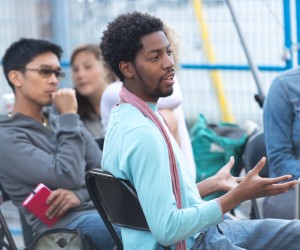
Andrew Coyne is questioned about the role of expertise in the cultural sector. Photo: Dahlia Katz
As moderator of the ‘An End To Arts Funding?‘ debate at SummerWorks, it seems unethical for me to engage in any sort of critique of the arguments presented Wednesday.
I hope to moderate more debates in the future, and I can’t have debaters wary that although I am quite pleasant in person, I’m storing their arguments for digital deconstruction post-event.
However, there have been a number of responses from people who were in attendance and have posted their thoughts online:
And of course, before the debate Nadia Ross published this ‘opening statement’ here on Praxis:
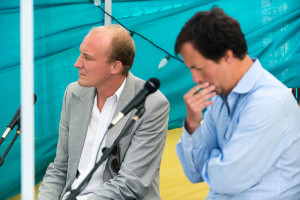
Photo: Dahlia Katz
Tangentially, a conversation came up at the debate connected to an ongoing discussion in this space: performance and memory.
Mr. Coyne conceded there was probably some role for the state to play in archiving and preserving great works, noting that mark of a great writer is their words survive themselves and their era.
As theatre artists, we can’t aspire for our work to be preserved in the same way. You were either there, or you weren’t, and you missed it. Gone forever. We can archive notes, programs, props – even scripts – but the work itself cannot be preserved (as Holger Syme also notes in his post to makes a different point) in a way that it can be reproduced .
This is neither here nor there with regards to the substance of the debate, but it reminds me that part of what makes live performance distinct is it is ephemeral and I am cool with that.
by Michael Wheeler
 This week SummerWorks Artistic Director Michael Rubenfeld asked me to moderate today’s debate on the question: An End to Arts Funding? Of course I agreed.
This week SummerWorks Artistic Director Michael Rubenfeld asked me to moderate today’s debate on the question: An End to Arts Funding? Of course I agreed.
It looks to be an exciting discussion, and I look forward to facilitating a fair and rigorous debate on the future of public investment in the arts.
PARTICIPANTS:
PRO: Andrew Coyne
CON: Nadia Ross
Moderator: Michael Wheeler
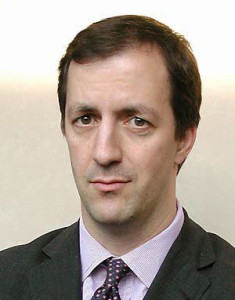
Andrew Coyne
FORMAT:
INTRO
Bios and Format introduced by Moderator
PRO
Opening statements 7 minutes
CON
Asks any clarifying questions 3 minutes
CON
Opening statements 7 minutes
PRO
Asks any clarifying questions 3 minutes
PRO
Responds to CON arguments and/or connects to their own 7 minutes
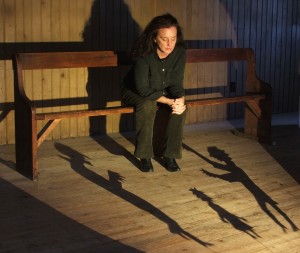
Nadia Ross
CON
Responds to PRO arguments and/or connects to their own 7 minutes
PRO
Closing Statement 5 minutes
CON
Closing Statement 5 minutes
AUD
5 x Questions From Audience:
2 minutes max per question, 3 minutes max to respond. 20-ish minutes
SummerWorks 2013 Debate. Lower Ossington Theatre, August 14, 2013 @ 5pm
by Nadia Ross
 On August 14th, as part of SummerWorks Performance Festival’s Shop Talk series, I will be having a debate with journalist Andrew Coyne (Postmedia, CBC’s The National) on the question: “An end to arts funding?”.
On August 14th, as part of SummerWorks Performance Festival’s Shop Talk series, I will be having a debate with journalist Andrew Coyne (Postmedia, CBC’s The National) on the question: “An end to arts funding?”.
Most of our revenue at STO Union comes from international festivals. But any creations that we’ve made at STO Union, usually started with a small grant.
When I look at what STO Union has accomplished over the years, on paper, it looks amazing: we’ve toured to the top festivals in the world, we’ve created small pieces that have long shelf lives and that bring in more revenue from fees than any grants they ever receive. But the reality of the job is that it has been more of a vocation than anything else.
I left Toronto officially in 2004. What propelled me out of the city was that I couldn’t stand seeing up close the capitulation of the art world to the market.
I had to find some kind of psychic ‘space’ that was still ‘free’, so I moved to a village in Quebec.
When I think ‘market’, I think of the square in my village where locals go to see their produce and wares. Down the block, there are two churches, restaurants, entertainment venues and a community centre. There are places of business, places for contemplation, places for entertainment, and a place for the community to gather. There’s also a post office, a fire department, and a hospital. I can see more sharply how society functions through the lens of the smaller scale that a village offers me.
What I am seeing is that the separation between what occupies human time is being eroded: when you’ve placed ‘money’ at the top of your priorities, then everything becomes the ‘market’: it affects the way we relate to each other, what we do with our time, how we work. All interactions become subtly, (and sometimes not so subtly), defined by this.

The market takes over the territory and empties it out of its most precious and unique qualities, turning everything into ‘work’. It’s like an invasion or an infection: slowly taking over our relationships, our time, our attention until that is all that we see. For me, as an artist, now is the time to respond to this, with all hands on board.
A recent letter from a professor to the students of Goldsmiths (University of London) to the students sums it up:
“Perhaps you disagree with my point of view – I can understand that you might be entirely resigned to the notion that capitalism will never be overcome. Maybe you have moved beyond this resignation into a full-blown cynicism. The impression you as artists give is often that everything has already been recuperated, that all radicalism is produced broken, that all resistance is already integrated into the capitalist whole. Your works often make the claim of regretting this, but it is a false claim insofar as it is a process to which they happily contribute. Clearly, few of you are actually interested in a critique of capitalism (but a pseudo-critique that sells will have to do), but for those of us who care about art, for those of us who think that art’s critical capacities have not been exhausted and extinguished, for those of us for whom the abolition of capitalism is not a choice but a necessity, you are the enemy.”
The debate I am having with Andrew Coyne is based on completely insane premises:
it doesn’t matter any more whether we go to the governments or to the business community for money to do our Art projects because the government is now too deeply influenced by the business community and corporate state. The liberal class failed to confront the rise of the corporate state and now it ceases to function.
Ultimately, the concept of ‘we don’t feed those who bite the hand that feeds them’ makes all funded art-work ultimately impotent. If it becomes too potent the funding will be withdrawn.
For myself, capitulation to the market has nothing to do with what ‘the people want and are willing to pay for’, it has to do with surrendering our last strongholds, the last bits of territory that the market doesn’t fully control. Without those free and open spaces, we are all just slaves in denial.
Nadia Ross is the artistic director for STO Union, one of the company’s at this year’s SummerWorks Performance Festival (7 Important Things). She lives in Wakefield, Quebec.
*Note the printed SummerWorks Guide incorrectly lists this debate as being on August 11th – it is in fact on August 14th at the Performance Bar at 5pm.
This week we were shocked to learn that The Vancouver Playhouse, a major institution in the national theatre ecology with a 49-year history, was closing its doors immediately effective Saturday night.
Some reactions from Vancouver & around the country:
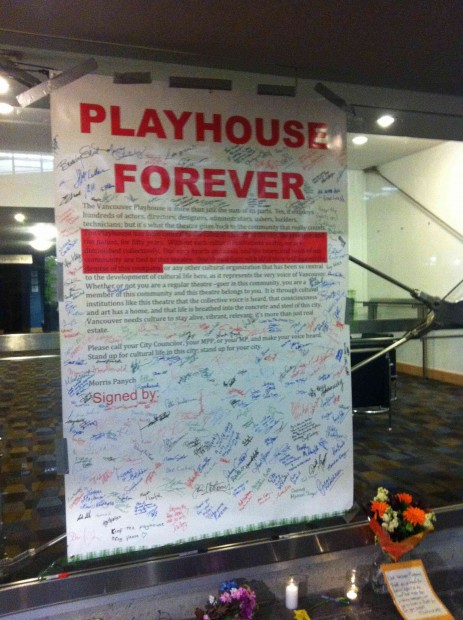
Photo by Lois Dawson
- The Globe & Mail’s Marsha Lederman covered the announcement here and the aftermath here
- @SMLois arrived with her iPhone to capture the end of an evening vigil outside of the theatre, which she blogged about here
- In backofthebook.ca, Frank Moher related the closure to a failure in Vancouver theatre criticism, among other factors
- The Charlebois Post collected a series of responses from Canadian Theatre artists here
- A response to assistance from the City by the Playhouse’s artistic managing director Max Riemer posted last September was getting heavy circulation on social media over the weekend
- Also circulating was this petition to Save The Vancouver Playhouse
Below is playwright and director Morris Panych’s letter as it appeared at the theatre during the final performance transcribed by Lois Dawson:
The Vancouver Playhouse is more than just the sum of its parts. Yes, it employs hundreds of actors, directors, designers, administrators, ushers, builders, technicians; but it’s what the theatre gives back to the community that really counts.
The Playhouse has been central to the cultural identity of the city, the province, and the nation, for fifty years. Without such cultural institutions as this, we are diminished collectively. Our very hearts and souls and the hearts and souls of our community are tied to this theatre. One should fight with all of the demise of this company or any other cultural organization that has been so central to the development of cultural life here, as it represents the very voice of Vancouver.
Whether or not you are a regular theatre-goer in this community, you are a member of this community and this theatre belongs to you. It is through cultural institutions like this theatre that the collective voice is heard, that consciousness and art has a home and that life is breathed into the concrete and steal of this city. Vancouver needs culture to stay alive, vibrant, relevant; it’s more than just real estate.
Please call your City Councillor, your MPP, or your MP, and make your voice heard. Stand up for cultural life in this city; stand up for your city.
~ Morris Panych
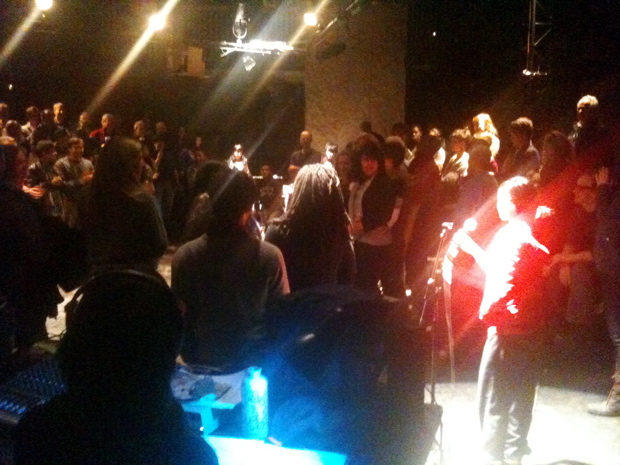
Parkdale-based teens, The Torontonians, perform at Wrecking Ball 11 'Now What?' a theatrical response to Rob Ford as Mayor of Toronto
by Michael Wheeler
Toronto culture scored a rare win this week at City Hall as arts grants and reduced library hours became some of the very few measures pulled off the chopping block in the 2012 budget by the City’s Executive Committee before it is voted on by all of City Council next week.
Barring a major backlash or unforeseen circumstances, this means Toronto culture will stay funded at $19/per capita. Arts grants will not be sliced and diced like many important social programs as the current budget suggests, although it is worth noting Toronto will remain dead last in cultural funding amongst major Canadian cities.
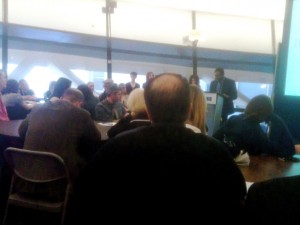
Councillor Michael Thompson addresses a standing-room only public consultation held at City Hall by the Creative Capital Initiative
Arts and culture is going to dodge a bullet; unlike fair wages for janitorial staff, shelters for homeless elderly people, swimming pools, a wide variety of community housing initiatives, day care programs, services for recent immigrants, and other essential programs Toronto invests in to promote an equitable and prosperous city.
We have arrived at this state of affairs because of a false crisis created by Mayor Rob Ford by reducing revenue through eliminating the Vehicle Registration Tax while promising gravy, but finding none.
The idea of a large deficit that must be immediately dealt with through massive cuts is a false narrative designed to shock Torontonians into making senseless choices that, to quote one City Councilor, “will be borne largely on the backs of women and children.”
Viewed in this context, restoring funding for arts and some libraries is a bit of a gut check for culture supporters.
Do we advocate only for ourselves, or are our efforts more broadly focused?
Do we want the arts to be funded because we like art and books (and some of us a paycheque), or is there a grander vision for an ecology in which culture is one important piece of a prosperous, reasonable and just society?
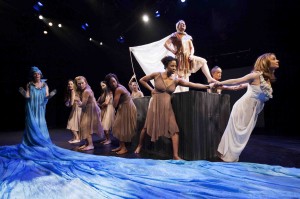
Nightwood Theatre's production of Margaret Atwood's The Penelopiad opened the same day arts cuts came off the table.
From @margaretatwood to The Creative Capital Initiative, and everything in between, it seems our cumulative disparate voices in support of culture have achieved a resonance that is impossible to ignore at City Hall.
Cultural activism in Toronto has been robust and intelligent over the last few years, with contributions from a wide variety of sectors and art forms. It is possible to view this reprieve as an admission of sorts that we are frigging crazy and can cause problems that are difficult to manage.
A clear and strident message from artists could crystallize the city-wide discontent with The Ford Approach to governance. Likewise, a submissive and satisfied arts sector that is grateful it has been spared the rod (this year), is just what this administration needs to push through a series of cuts that will impact our most vulnerable citizens.
With arts cuts off the table we have a unique opportunity to advocate not out of fear, but from the deep-seeded belief that a society should be set up to defend its least fortunate members. Time to get off the ferris wheel and finish re-writing this budget.
Michael Wheeler can be found on Twitter via @michaelcwheeler
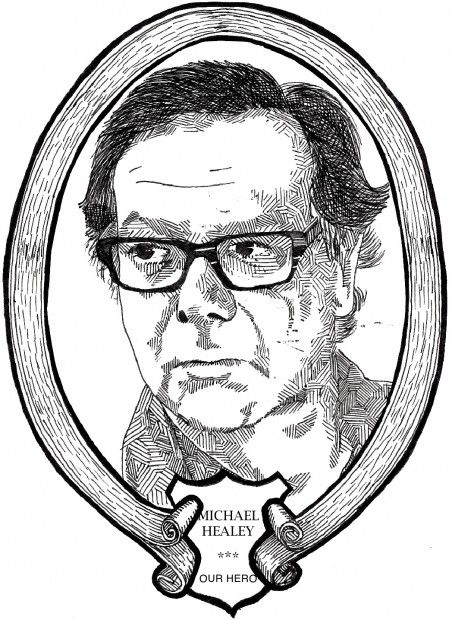
Michael Healey – Art by Jody Hewston
For the inaugural edition of our new series Culture Heroes by Jody Hewston, we look back at the past few months, and declare Michael Healey our clear Culture Hero of Summer, 2011.
In response to the Canadian Heritage department cutting its funding of Toronto’s SummerWorks Festival, Healey put out a call to action for all Artistic Directors of theatre companies that receive federal arts funding to come together in an act of solidarity for freedom of speech. His words were straight to the point:
If you find yourself anxious about the potential ramifications for your own company’s federal funding as a consequence of taking part in this demonstration, I can think of no better reason for participating in it.”
You can read an analysis of the SummerWorks Homegrown controversy here on the Praxis blog. Michael Healey’s own words in the Globe & Mail can be found here, and Globe theatre critic J. Kelly Nestruck’s views on the matter here. A great backgrounder on the story, as well as a list of the companies who answered Healey’s call is available here on the Wrecking Ball blog.
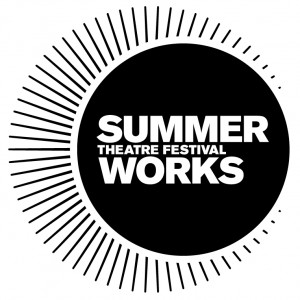
The proceeds frorm these nation-wide readings will go to the recently de-funded Summerworks Festival
by Michael Wheeler
Today will see over 70 companies across the country join together in readings of the play Homegrown by Catherine Frid, in an impressive display of solidarity amongst Canadian theatre artists.
As one of these 70, it is a heartfelt honour for Praxis Theatre to join our peers from coast-to-coast in an action that supports the notion that art is created within an ecosystem, and that it is a slippery slope down the road towards censorship if a government only forms relationships with artists that support or reinforce its ideological agenda.
Here’s all of the key Homegrown info:
As a final note, a tip of the hat to playwright Catherine Frid who didn’t ask for any of this but lends her play to the entire country tonight. And another to event organizer Michael Healey for showing leadership in pursuit of solidarity in a time when we needed both.

Image Courtesy of Natural Resources Canada
Momentum grows for nation-wide performances of Homegrown by all theatre organizations that receive federal funding in protest of Summerworks Festival being defunded by Federal Government
by Michael Wheeler
Last week saw freedom of speech and federal support for the arts come under unprecedented attack by the Harper Government when the Summerworks Festival had its Heritage Department funding pulled with no information given as to why.
This follows a series of co-ordinated attacks on the festival by SUN Media and even The Prime Minister himself, some of which I wrote about last August, when the performance of the play Homegrown by Catherine Frid, about a lawyer’s relationship with a man convicted of terrorism, was being used as a smokescreen to deflect attention from public outrage over the discontinuation of the long-form census.
Last week, Finance Minister Jim Flaherty followed up the Summerworks announcement with this statement:
“One thing I’d say, and maybe it’s different than it used to be, is we actually don’t believe in festivals and cultural institutions assuming that year after year after year they’ll receive government funding. They ought not assume entitlement to grants … no organization should assume in their budgeting that every year the government of Canada is going to give them grants because there’s lots of competition, lots of other festivals, and there are new ideas that come along. So it’s a good idea for everyone to stay on their toes and not make that assumption.”
While it may seem reasonable to suggest that arts organizations shouldn’t simply expect automatic renewal of funding, there is no argument to be made for this kind of cut to an organization with a strong record of meeting and exceeding its mandate, announcing consecutive years of record-breaking attendance and growth.
The cumulative message behind the Summerworks axe and the statement by the Finance Minister could not be more clear:
If you create work that critiques the Harper Government – we will take away your funding.
So begins what will likely be a challenging era for cultural institutions that are committed to making groundbreaking work which may (gasp) challenge the dominant value system – or just aren’t interested in being propagandists for a mean-spirited regime designed to respond to the commands of a leader who cannot tolerate criticism. When L’Etat C’est Moi is the rule of the day – and Moi has a big problem with people putting on plays about ideas he doesn’t agree with – Houston We Have A Problem.
Of course the argument is being presented that this is freeing up funds to support new ideas – but anyone who knows anything about the way the cultural ecosystem functions knows this is complete hogwash: Stripping Summerworks of $43,000 in funding to free up $500,000 for The Walk of Fame Festival is like declaring yourself pro-Rain, but anti-Cloud.
Even if we accept for a moment that promoting already famous people like Alex Trebek is a good idea that needs support from taxpayer dollars, how on earth do they imagine artists on very rare occasions become famous? They struggle to hone their craft in festivals devoted to groundbreaking work just like Summerworks, which has an extraordinary record as the birthplace for a number of the most exciting new works in Canadian performance. Last year’s Summerworks hit, Ride The Cyclone, recently announced an off-Broadway deal as a direct result of participating in Summerworks.

After traveling from Victoria BC to Toronto to participate in the National Series at Summerworks, Atomic Vaudeville's 'Ride The Cyclone' get a chance to take their show to NYC.
Almost none of the artists involved in Summerworks will be paid a living wage. Practically everyone doing a Summerworks show is working a second/third job and knows the best they can hope for financially is a small honorarium and that the show will go on to have a greater life after the festival. Everyone participating does it anyhow – because they know that Summerworks is an important place for new contemporary performance in Canada.
All of this is to say giving Summerworks the axe is an extremely poor approach to public policy and the cultural equivalent of poisoning the well.
The immediate impact of this politically motivated intervention in cultural policy is that ticket prices will go up and the marketing budget will go down. All tickets, including for the Praxis Theatre/The Original Norwegian Co-Pro, You Should Have Stayed Home, are now going up by 50% to $15. ($10 + $5 FST*) *Free Speech Tax. Summerworks is also in the midst of a grassroots fundraising campaign you can participate in here.
Canadian Actors Equity Association’s Executive Director Arden R. Ryshpan was the first member of the theatre community to respond to the situation with a statement released by CAEA last week:
“It is hard to interpret the Minister’s statement as anything but a threat and a potential ideological attack on the arts. I don’t recall seeing similar statements made about long-term government support to other industries such as forestry, fisheries or mining. Given that our industry is larger than all three of these sectors combined, we deserve better from our Government including meaningful consultation leading to thoughtful program change and development, if required. An off-the-cuff remark by a Minister alluding to substantial change of practice is shocking and imprudent.”
Artists across the country have also independently begun to respond positively and pro-actively to the situation. The Globe and Mail reports Western Edge Theatre in Nanaimo, B.C. will perform a public reading of Homegrown on July 15 with all proceeds going to The Summerworks Festival.
Multi Dora-winning Shaw and Tarragon playwright Michael Healey has sent out a call to action to all Artistic Directors of organizations that receive Federal arts funding to join Western Edge Theatre in performing a reading of the play, whether or not they participate in the fundraising initiative. Healey has offered to provide scripts and keep a list of participating companies so that the initiative can continue to gain momentum.
This is not the type of storm theat can be weathered by hoping they won’t come for you. Or if they do survive it that way – lets talk about how relevant the work those theatres end up putting on will be. Will Stephen Harper’s vision of Canada be the only art that forms partnerships with the government? The final sentence of Michael Healey’s message to AD’s of Canadian Theatres urging them to participate in a nationwide reading of Homegrown expresses best the necessity of a national response to this attack on Canadian culture:
“If you find yourself anxious about the potential ramifications for your own company’s federal funding as a consequence of taking part in this demonstration, I can think of no better reason for participating in it.”

Someone forgot to tell the PM that encouraging Nickelback actually reduces Canadian culture...or did they?
by Michael Wheeler
Shortly after the 2008 Federal election, Peter Donolo, soon-to-be Chief of Staff to Liberal leader Michael Ignatieff, addressed a select group of executive directors and organizational leaders at an industry seminar organized by The Arts Advocate. In his role as pollster for The Globe and Mail during the election, Donolo had accumulated extensive data on the arts and how it had impacted the race. One piece of information from his presentation produced audible exhalations and dismayed nodding of heads:
The highest polling numbers the Harper campaign ever saw in the province of Ontario were on the day after his Ordinary People Don’t Care About The Arts statement (Sept 24/08).
However much it seems retrospectively the comments were a careless slip that may have cost the government a majority, the reality is there was an emotional resonance to this message that initially gave him momentum in a battleground province. Eventually, these numbers receded in the weeks before voters went to the polls, leaving the merged Canadian Alliance and PC parties short of a majority government with the support of just over one third of the electorate.
Seen in this context, comments made by the PM to the national media that he was “concerned” by Catherine Frid’s play Homegrown at the 2010 Summerworks Festival begin to fit into the government’s larger agenda as a strategic exercise by a government no longer able to communicate through rational discourse. These comments point to a desire to use emotionally charged signposts to frame discussions and talking points, rather than the merits of programs and policies based on data or logic.
Will we talk about the arts next election in relation to harnessing our imaginations and creativity within a complex and multidimensional culture? Or will we discuss the arts in relation to whether we should use tax dollars to support terrorism? These are the types of paradigms that are being established in the discourse leading up to the next election.
If Harper succeeds in connecting arts funding and supporting terrorism, it will fit in well with a campaign that paints public funding for political parties to replace the influence of massive donations by corporations and unions as supporting separatism, a coalition government as advocating socialism, and an inquiry into the largest series of civil rights violations in Canadian history at G20 as supporting anarchism.
Of course none of these references are true, but it doesn’t matter. Every mainstream reviewer who saw Homegrown went out of their way to specifically address the allegations by the PM and his office that the play “glorified terrorism”. Each one reached the identical explicit conclusion that the play in no way justified or supported terrorism. What matters is that arts funding and taking a “sympathetic” view of terrorism are now a cultural meme that some people will remember. Mission accomplished.
This type of highly emotional and dramatic hyperbole will be backed up by an impressive war chest accumulated by the Conservative Party that has been significantly out-fundraising the opposition since fall 2008. In the lead up to the next election, this will back a multi-million dollar wave of negative ads in every media geared at emotional flashpoints in an effort to define complex policy issues with simple narratives that elicit a kneejerk response from sub-cortical “reptilian” elements of the brain.
By hoping to communicate with voters through fight or flight stimuli, the goal is to avoid any rational or substantive debate. Next year, without any reliable or detailed information available through the census, there will be even less data available to evaluate and discuss policies and programs. The heavily partisan bent of the Harper government has forced it to abdicate a knowledge-based discussion of their policies, save a few economic statistics that neglect to mention the sizeable budget surplus Canada had when they took the reins of government and the huge deficit they have generated five years later.

When Kory Teneycke (l) was Communications Director to the PM they both lunched in NYC with Fox News President Rupert Murdoch. Four months later he left his position to lead Quebecor Media's attempt to rewrite CRTC rules in their favour to start Fox News North, which he is pictured announcing.
This embrace by Conservative strategists of US Tea Party-style political tactics is set to be joined by the biggest weapon in regressive populist media: Our very own Fox News. Upset that the current CRTC head won’t fast track a special Category 1 licence for a national TV station to be run by Harper’s previous spokesperson, Harper is set to replace him with someone who is willing to break CRTC rules to allow him a national TV station dedicated to supporting and propagating his ideology.
Who owns the station “applying” for this licence? You guessed it: SUN Media. The very same SUN Media that created the Homegrown controversy in their Toronto newspaper and scandalously asked Harper about the play with one of only two English language questions available to the media in Harper’s first comments to the country in over a month. It has since been revealed that virtually every other journalist in attendance had already agreed to ask him about the census. (What the entire national media didn’t think Canadians from coast-to-coast were dying to hear the PMs thoughts on a summer indie theatre festival?)
There is an unfortunate logic to politics that right-wing parties are succeeding when they are talking about the military and the economy, and failing when they talk about things like education, healthcare and culture. By framing culture as a “spending” and “national security” issue they are effectively taking a topic that is a loser for them and turning it into a winner. Combine that with the strong numbers in Ontario after Harper’s anti-arts statements in 2008 and the fact the Conservatives have given up completely in Quebec, and we may be looking at another election where arts and culture is again under attack.
This is not necessarily a great strategy for Harper – where last election arts and culture supporters were caught off guard being attacked by their own government, this election they will be organized, have lists of active supporters in every major city, and have identified leaders and organizing strategies that target swing ridings. They are also way better than them at gaining earned media and using the internet. At the end of the day, it will be up to the opposition, the non-Quebecor owned press, and civil society to shift the debate out of the highly emotional, into factual analysis of the policies and parties that will best serve the country.
Lately, it has been the subject of some media as to whether an emotional, ideologically-based discussion of policies and programs can become a substitute for rational debate that includes data and information.
It can not.




 This week SummerWorks Artistic Director Michael Rubenfeld asked me to moderate today’s debate on the question: An End to Arts Funding? Of course I agreed.
This week SummerWorks Artistic Director Michael Rubenfeld asked me to moderate today’s debate on the question: An End to Arts Funding? Of course I agreed.

 On August 14th, as part of
On August 14th, as part of 










Recent Comments